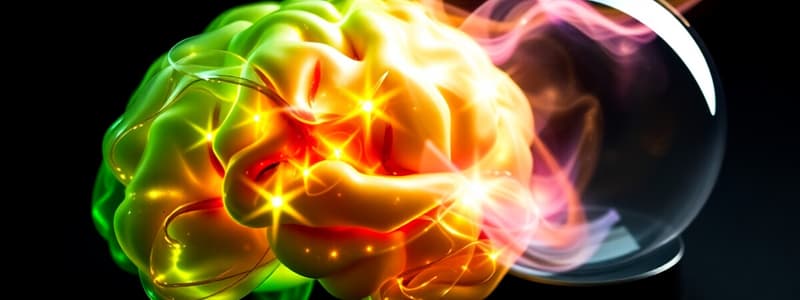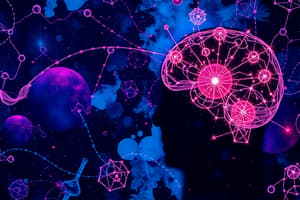Podcast
Questions and Answers
Which form of psychology is focused on real-world application of scientific knowledge?
Which form of psychology is focused on real-world application of scientific knowledge?
- Popular Psychology
- Professional Psychology (correct)
- Academic Psychology
- Experimental Psychology
Who is associated with the concept of falsificationism in the philosophy of science?
Who is associated with the concept of falsificationism in the philosophy of science?
- Imre Lakatos
- Thomas Kuhn
- Paul Feyerabend
- Karl Popper (correct)
What term is used to describe psychology that reflects public interest and beliefs about behavior?
What term is used to describe psychology that reflects public interest and beliefs about behavior?
- Public Psychology (correct)
- Scientific Psychology
- Professional Psychology
- Academic Psychology
Which philosopher is known for the work 'The Structure of Scientific Revolutions'?
Which philosopher is known for the work 'The Structure of Scientific Revolutions'?
What is the main focus of epistemology in the context of psychology?
What is the main focus of epistemology in the context of psychology?
Which of the following is NOT one of the three forms of psychology mentioned?
Which of the following is NOT one of the three forms of psychology mentioned?
What does Lakatos suggest is the primary measure of a research program's success?
What does Lakatos suggest is the primary measure of a research program's success?
Imre Lakatos is known for which of the following contributions to the philosophy of science?
Imre Lakatos is known for which of the following contributions to the philosophy of science?
Which philosopher is known for advocating an anarchistic view of science?
Which philosopher is known for advocating an anarchistic view of science?
Which of these philosophers argued against traditional methods in science?
Which of these philosophers argued against traditional methods in science?
Which of the following best describes the relationship between Lakatos and Kuhn?
Which of the following best describes the relationship between Lakatos and Kuhn?
What aspect of scientific method does Feyerabend challenge in his works?
What aspect of scientific method does Feyerabend challenge in his works?
Which of the following philosophers did Lakatos overlap with in his academic career?
Which of the following philosophers did Lakatos overlap with in his academic career?
What is the primary distinction between induction and deduction as described?
What is the primary distinction between induction and deduction as described?
According to Kuhn's theory, what typically prompts a 'paradigm shift' in science?
According to Kuhn's theory, what typically prompts a 'paradigm shift' in science?
What does Thomas Kuhn mean by 'incommensurable paradigms'?
What does Thomas Kuhn mean by 'incommensurable paradigms'?
Which statement accurately reflects the role of anomalies in Kuhn's view of scientific progress?
Which statement accurately reflects the role of anomalies in Kuhn's view of scientific progress?
What characterizes the periods of 'normal science' in Kuhn's theory?
What characterizes the periods of 'normal science' in Kuhn's theory?
What is the main criterion advocated by Popper that distinguishes empirical sciences from non-science?
What is the main criterion advocated by Popper that distinguishes empirical sciences from non-science?
Which statement best reflects Popper's views on scientific theories?
Which statement best reflects Popper's views on scientific theories?
What was the main objective of the experiment conducted during the solar eclipse concerning Einstein's theory?
What was the main objective of the experiment conducted during the solar eclipse concerning Einstein's theory?
How did Euler, Eddington, and Dyson interpret Newton's contribution to the light deflection predictions?
How did Euler, Eddington, and Dyson interpret Newton's contribution to the light deflection predictions?
What aspect of scientific theories did Popper's philosophy primarily challenge?
What aspect of scientific theories did Popper's philosophy primarily challenge?
What was the significance of the solar eclipse experiment of 1919?
What was the significance of the solar eclipse experiment of 1919?
What stage occurs after anomalies arise in Kuhn's model of scientific revolutions?
What stage occurs after anomalies arise in Kuhn's model of scientific revolutions?
Which philosopher sought to reconcile Popper's falsificationism with Kuhn's paradigms?
Which philosopher sought to reconcile Popper's falsificationism with Kuhn's paradigms?
In Kuhn's framework, what is typically set aside when a paradigm is challenged by an anomaly?
In Kuhn's framework, what is typically set aside when a paradigm is challenged by an anomaly?
What does normal science primarily involve according to Kuhn?
What does normal science primarily involve according to Kuhn?
What is the first stage in Kuhn's model of scientific development?
What is the first stage in Kuhn's model of scientific development?
What typically results from a scientific revolution according to Kuhn?
What typically results from a scientific revolution according to Kuhn?
What characterizes the 'crisis' phase in Kuhn's structure of scientific discovery?
What characterizes the 'crisis' phase in Kuhn's structure of scientific discovery?
Lakatos’s approach to scientific methodology emphasizes which aspect?
Lakatos’s approach to scientific methodology emphasizes which aspect?
What is the primary focus of Popper's thesis in scientific inquiry?
What is the primary focus of Popper's thesis in scientific inquiry?
Which statement accurately reflects Feyerabend's perspective on scientific methodology?
Which statement accurately reflects Feyerabend's perspective on scientific methodology?
Which of the following theorists is associated with the concept of 'normal science'?
Which of the following theorists is associated with the concept of 'normal science'?
What critique did Feyerabend make against the established methodologies in science?
What critique did Feyerabend make against the established methodologies in science?
In what way does Lakatos's view differ from Kuhn's regarding scientific progress?
In what way does Lakatos's view differ from Kuhn's regarding scientific progress?
Which development is cited as an example of a negative outcome in Popper's methodology?
Which development is cited as an example of a negative outcome in Popper's methodology?
What key critique is leveled against the Ptolemaic system in the context of scientific methodology?
What key critique is leveled against the Ptolemaic system in the context of scientific methodology?
Which scientist is associated with defending heliocentrism and is noted for using rhetorical methods?
Which scientist is associated with defending heliocentrism and is noted for using rhetorical methods?
Flashcards
Epistemology
Epistemology
A branch of philosophy focused on the theory of knowledge: How we know what we know, the reliability of knowledge, and the nature of truth.
Psychology
Psychology
The study of the mind and behavior, encompassing various approaches, methods, and applications.
Academic Psychology
Academic Psychology
A specific type of psychology conducted in research institutions, universities, and colleges, focused on generating and testing new knowledge.
Professional Psychology
Professional Psychology
Signup and view all the flashcards
Popular Psychology
Popular Psychology
Signup and view all the flashcards
Falsificationism
Falsificationism
Signup and view all the flashcards
Paradigm Shift
Paradigm Shift
Signup and view all the flashcards
Research Programs
Research Programs
Signup and view all the flashcards
Inductive Reasoning
Inductive Reasoning
Signup and view all the flashcards
Deductive Reasoning
Deductive Reasoning
Signup and view all the flashcards
Scientific Paradigm
Scientific Paradigm
Signup and view all the flashcards
Normal Science
Normal Science
Signup and view all the flashcards
Paradigm
Paradigm
Signup and view all the flashcards
Anomaly
Anomaly
Signup and view all the flashcards
Scientific Revolution
Scientific Revolution
Signup and view all the flashcards
Methodology of Scientific Research Programs
Methodology of Scientific Research Programs
Signup and view all the flashcards
Scientific Research Program
Scientific Research Program
Signup and view all the flashcards
Progressive Research Program
Progressive Research Program
Signup and view all the flashcards
Demarcation Problem
Demarcation Problem
Signup and view all the flashcards
Falsifiability in Science
Falsifiability in Science
Signup and view all the flashcards
Einstein's Principle of Equivalence
Einstein's Principle of Equivalence
Signup and view all the flashcards
Gravitational Lensing
Gravitational Lensing
Signup and view all the flashcards
Dyson-Eddington-Davidson Test
Dyson-Eddington-Davidson Test
Signup and view all the flashcards
Nineteenth-Century Wave Theory of Light
Nineteenth-Century Wave Theory of Light
Signup and view all the flashcards
Light Deflection
Light Deflection
Signup and view all the flashcards
Lakatos's Research Programs
Lakatos's Research Programs
Signup and view all the flashcards
Progressiveness in Research Programs
Progressiveness in Research Programs
Signup and view all the flashcards
Epistemological Anarchism (Feyerabend)
Epistemological Anarchism (Feyerabend)
Signup and view all the flashcards
Diversity in Scientific Process
Diversity in Scientific Process
Signup and view all the flashcards
Rejection of Universal Methodological Rules
Rejection of Universal Methodological Rules
Signup and view all the flashcards
Anomalies in science
Anomalies in science
Signup and view all the flashcards
Young scientists role in paradigm shifts
Young scientists role in paradigm shifts
Signup and view all the flashcards
Feyerabend’s philosophy of science
Feyerabend’s philosophy of science
Signup and view all the flashcards
Example of Paradigm shift: Chemical Revolution
Example of Paradigm shift: Chemical Revolution
Signup and view all the flashcards
Example of Paradigm shift: Quantum Mechanics
Example of Paradigm shift: Quantum Mechanics
Signup and view all the flashcards
Study Notes
History of Psychology - Session 12
- Session 12 focuses on the nature of psychology as a science
Session Schedule
- Session dates, topics, instructors, slide links, and reading materials are listed
- Each session covers different aspects of psychology, like pre-psychology, psychoanalysis, behaviorism, and cognitive and decision science.
Learning Objectives for Today
- Distinguishing various approaches to psychology (e.g., academic, professional, popular)
- Understanding different epistemological positions (falsificationism, paradigm shifts)
- Analyzing psychology's scientific methodology
Different Forms of Psychology
- Psychology exists in three forms: academic/scientific, professional, and popular
- Academic psychology is found in universities and colleges
- Professional psychology uses scientific principles to address problems
- Popular psychology encompasses public interest in behaviors and mental states
What is Epistemology?
- Epistemology is a branch of philosophy dedicated to knowledge theories
- It's crucial to psychology because it examines the nature of psychological knowledge
Epistemology and History of Science
- Key figures and their works, like Karl Popper's The Logic of Scientific Discovery (1934/1959) and Thomas Kuhn's The Structure of Scientific Revolutions (1962)
- Other key figures include Imre Lakatos and Paul Feyerabend
Exam Format and Information
- The exam will consist of multiple-choice questions (30 questions in total)
- Including specific question types, like A-type and K-type questions
- Exam dates and locations are provided
Studying That Suits You
Use AI to generate personalized quizzes and flashcards to suit your learning preferences.
Related Documents
Description
Explore the key concepts of the philosophy of science as it relates to psychology. This quiz covers major figures, such as Lakatos and Kuhn, and their contributions to understanding scientific methods and real-world applications. Test your knowledge on various schools of thought and their implications in psychological research.




